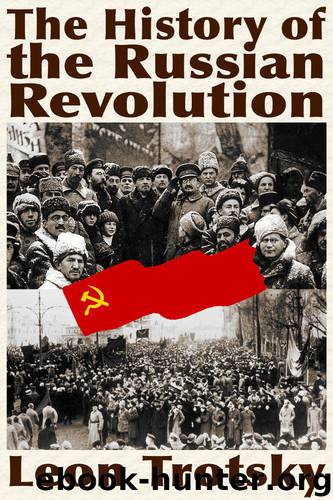The History of the Russian Revolution by Leon Trotsky

Author:Leon Trotsky [Trotsky, Leon]
Language: eng
Format: epub
Tags: Non-fiction, History, Russia, Revolution
Publisher: Marxists Internet Archive
Published: 1932-01-22T00:00:00+00:00
Chapter 30
The State Conference in Moscow
If a symbol is a concentrated image, then a revolution is the master-builder of symbols, for it presents all phenomena and all relations in concentrated form. The trouble is that the symbolism of a revolution is too grandiose; it fits in badly with the creative work of individuals. For this reason artistic reproductions of the greatest mass dramas of humanity are so poor.
The Moscow State Conference ended in the failure assured in advance. It created nothing and decided nothing. However, it has left to the historian an invaluable impression of the revolution – although a negative impression, one in which light appears as shadow, weakness parades as strength, greed as disinterestedness, treachery as the highest valor. The mightiest party of the revolution, which in only ten weeks was to arrive at the power, was left outside the walls of the Conference as a magnitude not worth noticing. At the same time the “party of evolutionary socialism,” unknown to anybody, was taken seriously. Kerensky stepped forth as the incarnation of force and will. The Coalition, wholly exhausted in the past, was spoken of as a means of future salvation. Kornilov, hated by the soldier millions, was greeted as the beloved leader of the army and the people. Monarchists and Black Hundred men registered their love for the Constituent Assembly. All those who were about to retire from the political arena behaved as though they had agreed for one last time to play their best rôles on the stage of a theater. They were all eager to shout with all their might: Here is what we wanted to be! Here is what we would have been, if they had not prevented us! What prevented them was the workers, the soldiers, the peasants, the oppressed nationalities. Tens of millions of “slaves in revolt” prevented them from demonstrating their loyalty to the revolution. In Moscow where they had gone for shelter a strike followed on their heels. Harried by “dark elements,” by “ignorance,” by “demagoguism,” these two and a half thousand people, having crowded into a theater, tacitly agreed together not to violate the histrionic illusion. Not a word was spoken about the strike. They tried never to mention the Bolsheviks by name. Plekhanov recalled “the unhappy memory of Lenin” just in passing, and as though he were talking of an enemy completely routed. The impression thus bore the character of a negative to the last detail: in this kingdom of half-buried shades, giving themselves out for “the living forces of the nation,” the authentic people’s leader could not possibly figure otherwise than as a political cadaver.
“The brilliant auditorium,” writes Sukhanov, “was quite sharply divided into two halves: to the right sat the bourgeoisie, to the left the democracy. In the orchestra and loges to the right many uniforms of generals were to be seen, and to the left ensigns and soldiers. Opposite the stage in the former imperial loge were seated the higher diplomatic representatives of the Allied and friendly powers .
Download
This site does not store any files on its server. We only index and link to content provided by other sites. Please contact the content providers to delete copyright contents if any and email us, we'll remove relevant links or contents immediately.
| Africa | Americas |
| Arctic & Antarctica | Asia |
| Australia & Oceania | Europe |
| Middle East | Russia |
| United States | World |
| Ancient Civilizations | Military |
| Historical Study & Educational Resources |
Red Famine: Stalin's War on Ukraine by Anne Applebaum(2927)
Midnight in Chernobyl by Adam Higginbotham(2541)
Chernobyl by Serhii Plokhy(2534)
Midnight in Chernobyl: The Untold Story of the World's Greatest Nuclear Disaster by Adam Higginbotham(2219)
Red Shambhala by Andrei Znamenski(2192)
The House of Government by Slezkine Yuri(2190)
The Gulag Archipelago (Vintage Classics) by Aleksandr Solzhenitsyn(2093)
Red Notice by Bill Browder(2070)
All the Kremlin's Men by Mikhail Zygar(2064)
From Cold War to Hot Peace by Michael McFaul(2027)
Putin's Labyrinth(2016)
From Russia with Lunch by David Smiedt(1970)
The Future Is History by Masha Gessen(1904)
A People's Tragedy by Orlando Figes(1862)
The Romanovs by Simon Sebag Montefiore(1820)
How to Tame a Fox (and Build a Dog): Visionary Scientists and a Siberian Tale of Jump-Started Evolution by Lee Alan Dugatkin & Lyudmila Trut(1760)
The Lost Spy by Andrew Meier(1745)
Putin's Labyrinth: Spies, Murder, and the Dark Heart of the New Russia(1740)
Art and Revolution by John Berger(1720)
